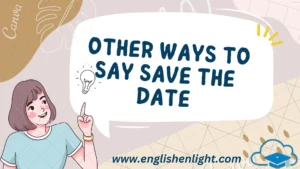Introduction
Unlock the professionalism in your communication with 15+ formal ways to request feedback respectfully. Embrace clarity and collaboration by choosing the appropriate level of formality in your interactions. Elevate your language to demonstrate respect and openness to alternative perspectives.
In professional communication, conveying requests politely is paramount. When seeking someone’s input or opinion, it’s essential to use language that is both respectful and clear. Here are over 15 formal ways to express “please let me know your thoughts,” along with scenario examples to illustrate their usage.
List Of Ways To Say ““Please Let Me Know Your Thoughts”
- Kindly Share Your Insights
- I Would Appreciate Your Input
- Your Thoughts Would Be Valued
- I Welcome Your Considerations
- Seeking Your Perspective
- Requesting Your Opinion
- Your Feedback Is Solicited
- I Await Your Reflections
- Seeking Your Expertise
- Your Views Are Important
- I’m Eager to Hear Your Impressions
- Your Thoughts Are Awaited
- I Value Your Point of View
- Kindly Provide Your Feedback
- Your Input Is Requested
- I’m Interested in Your Thoughts
- I Anticipate Your Response
- “Mind Sharing Your Insights?”
- “Could I Pick Your Brain?”
- “Seeking Your Unique Angle”
OverView
This overview explores the importance and nuances of formal communication in professional settings, specifically focusing on ways to request feedback or opinions politely. It highlights the significance of clear and respectful language in soliciting input from colleagues or stakeholders.
The subsequent list presents 17 formal alternatives to the phrase “Please let me know your thoughts,” each accompanied by a scenario example to illustrate its usage effectively. Furthermore, it discusses the professionalism of using such phrases, emphasizing their role in demonstrating openness to collaboration and consideration of alternative perspectives. While these formal expressions are generally appropriate, the overview acknowledges that their effectiveness may vary depending on industry, organizational culture, and communication context.
The overview concludes by weighing the pros and cons of employing formal language, underscoring its benefits in fostering professionalism and collaboration while also noting potential drawbacks such as perceived stiffness or cultural differences. Ultimately, it advocates for thoughtful consideration of context and recipient when choosing the appropriate level of formality in professional communication.
Is It Professional to Say “Please Let Me Know Your Thoughts”?
Certainly! The professionalism of saying “Please let me know your thoughts” depends on the context and the relationship between the individuals involved. In many professional settings, this phrase is commonly used as a courteous and respectful way to solicit feedback, opinions, or insights from colleagues, clients, or stakeholders.
It demonstrates an openness to collaboration and a willingness to consider alternative perspectives, which are key aspects of professionalism in many fields. However, the appropriateness of this phrase may vary depending on the specific industry, organizational culture, and the formality of the communication.
In more formal or hierarchical environments, alternative phrases or structures may be preferred. Ultimately, using language that is clear, respectful, and appropriate to the context is essential in maintaining professionalism in communication.
Formal Ways to Say “Please Let Me Know Your Thoughts”
1. Kindly Share Your Insights
Dear Daniel Brown,
I hope this email finds you well. I am writing to kindly request your insights on the latest marketing proposal. Your expertise in this area would be greatly appreciated. Please review the attached document at your earliest convenience and share your insights.
Warm regards,
Adam Evans
2. I Would Appreciate Your Input
Dear Mr. Brown,
I trust you are doing well. I am currently working on a project and would greatly appreciate your input. Your expertise in financial analysis would be invaluable here. Could you please review the spreadsheet attached and provide your thoughts?
Thank you in advance,
Adam Evans
Read More:
3. Your Thoughts Would Be Valued

Dear Daniel,
I hope this email finds you well. I’m reaching out to you because your thoughts would be valued regarding the upcoming conference agenda. Your experience in event planning could offer valuable insights. Please take a moment to review the proposed schedule and share your feedback.
Best regards,
Adam
4. I Welcome Your Considerations
Dear Mr. Brown,
I trust this email finds you in good spirits. As we finalize the budget for the next quarter, I welcome your considerations regarding the allocation of resources. Your input will be instrumental in ensuring our financial planning is thorough and effective. Please review the attached spreadsheet and share your thoughts at your earliest convenience.
Warm regards,
Adam Evans
5. Seeking Your Perspective

Dear Daniel,
I hope this message finds you well. I’m currently working on a strategic plan for the upcoming year and am seeking your perspective on our marketing strategies. Your insights into consumer behavior would be highly valuable. Could you please review the outlined strategies and provide your perspective?
Best regards,
Adam
6. Requesting Your Opinion
Dear Mr. Brown,
I trust this email finds you well. I am writing to request your opinion on the proposed changes to our employee benefits package. Your experience in HR management would be greatly appreciated here. Please take a moment to review the attached document and share your thoughts.
Thank you,
Adam Evans
7. Your Feedback Is Solicited
Dear Daniel,
I hope this email finds you well. We are in the process of revamping our customer service procedures, and your feedback is solicited. Your experience in client relations would be invaluable here. Please review the outlined changes and provide your feedback by the end of the week.
Best regards,
Adam
8. I Await Your Reflections
Dear Mr. Brown,
I trust you are doing well. I am writing to discuss the recent project proposal and await your reflections. Your insights into project management would be highly valuable. Please review the proposal and share your thoughts at your earliest convenience.
Thank you,
Adam Evans
9. Seeking Your Expertise
Dear Daniel,
I hope this email finds you well. As we delve into the market analysis for our new product launch, I am seeking your expertise. Your background in market research would be invaluable here. Please review the attached report and provide your insights.
Warm regards,
Adam
10. Your Views Are Important

Dear Mr. Brown,
I trust this email finds you well. We are currently exploring new opportunities for expansion, and your views are important. Your knowledge of industry trends would be highly valuable in this regard. Please review the proposed expansion plans and share your views.
Best regards,
Adam Evans
11. I’m Eager to Hear Your Impressions
Dear Daniel,
I hope this message finds you well. I’m reaching out because I’m eager to hear your impressions on the recent client presentation. Your expertise in client relations could offer valuable insights. Please share your impressions and any suggestions for improvement.
Best regards,
Adam
12. Your Thoughts Are Awaited
Dear Mr. Brown,
I trust you are doing well. We are in the process of finalizing the budget for the upcoming fiscal year, and your thoughts are awaited. Your financial acumen would be invaluable in ensuring accuracy and efficiency. Please review the budget proposal and share your thoughts at your earliest convenience.
Warm regards,
Adam Evans
13. I Value Your Point of View
Dear Daniel,
I hope this email finds you well. We are currently evaluating our sales strategies for the next quarter, and I value your point of view. Your sales expertise could offer valuable insights into this process. Please review the proposed strategies and share your perspective.
Best regards,
Adam
14. Kindly Provide Your Feedback
Dear Mr. Brown,
I trust this email finds you well. As we embark on the redesign of our company website, kindly provide your feedback on the proposed layout. Your eye for design would be greatly appreciated here. Please review the mockups attached and share your feedback.
Thank you,
Adam Evans
15. Your Input Is Requested
Dear Daniel,
I hope this message finds you well. We are in the process of refining our customer service policies, and your input is requested. Your experience in customer relations could offer valuable insights. Please review the proposed changes and share your input.
Warm regards,
Adam
16. I’m Interested in Your Thoughts
Dear Mr. Brown,
I trust you are doing well. I am currently reviewing our sales forecast for the next quarter and I’m interested in your thoughts. Your sales expertise would be invaluable in this process. Please review the forecast and share your thoughts at your earliest convenience.
Best regards,
Adam Evans
17. I Anticipate Your Response
Dear Daniel,
I hope this email finds you well. We are in the process of finalizing the agenda for the upcoming board meeting, and I anticipate your response. Your insights into corporate governance would be highly valuable here. Please review the proposed agenda and confirm your availability for the meeting.
Warm regards,
Adam
18. “Mind Sharing Your Insights?”
Scenario Example:
Subject: Request for Feedback on Marketing Proposal
Dear Daniel Brown,
I hope this email finds you well. I am writing to kindly request your insights on the latest marketing proposal. Your expertise in this area would be greatly appreciated. Please review the attached document at your earliest convenience and share your insights.
Warm regards,
Adam Evans
19. “Could I Pick Your Brain?”
Scenario Example:
Subject: Request for Financial Analysis Input
Dear Mr. Brown,
I trust you are doing well. I am currently working on a project and would greatly appreciate your input. Your expertise in financial analysis would be invaluable here. Could you please review the spreadsheet attached and provide your thoughts?
Thank you in advance,
Adam Evans
20. “Seeking Your Unique Angle”
Scenario Example:
Subject: Invitation to Share Your Perspective
Dear Daniel,
I hope this email finds you well. I’m currently working on a project and I’m seeking your unique angle on the matter. Your expertise and insights would greatly enrich our discussions. Would you be available for a brief meeting next week to discuss further?
Looking forward to hearing from you,
Adam Evans
Pros and Cons
| Pros | Cons |
| Utilizing formal language demonstrates professionalism and respect. | Overuse of formal language can sometimes come across as overly stiff or impersonal. |
| Clear and polite communication encourages a positive response. | It may take more time to craft formal requests compared to informal ones. |
| Requesting input fosters collaboration and engagement. | Different cultures may interpret formal language differently, so it’s essential to consider the context and recipient. |
Conclusion
In conclusion, employing formal language when requesting input or opinions demonstrates professionalism and respect in professional communication. By using these 17 formal ways to ask for someone’s thoughts, you can foster collaboration and ensure clear and polite communication. Remember to consider the context and recipient when choosing the appropriate level of formality

Hi, I’m Alexander, the admin of the website “English Enlight.” My job is to make sure everything runs smoothly on the site. I help users if they have any problems and make sure all the information is correct. It’s important to me that everyone enjoys using our website and learns something new about English every time they visit. If you need any help or have any questions, feel free to reach out to me!













